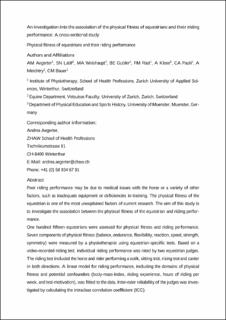Please use this identifier to cite or link to this item:
https://doi.org/10.21256/zhaw-18851Full metadata record
| DC Field | Value | Language |
|---|---|---|
| dc.contributor.author | Aegerter, Andrea | - |
| dc.contributor.author | Latif, Selma | - |
| dc.contributor.author | Weishaupt, Michael | - |
| dc.contributor.author | Gubler, Barbara | - |
| dc.contributor.author | Rast, Fabian | - |
| dc.contributor.author | Klose, Andreas | - |
| dc.contributor.author | Pauli, Carole | - |
| dc.contributor.author | Meichtry, André | - |
| dc.contributor.author | Bauer, Christoph | - |
| dc.date.accessioned | 2019-12-09T15:18:30Z | - |
| dc.date.available | 2019-12-09T15:18:30Z | - |
| dc.date.issued | 2020 | - |
| dc.identifier.issn | 1755-2540 | de_CH |
| dc.identifier.issn | 1755-2559 | de_CH |
| dc.identifier.uri | https://digitalcollection.zhaw.ch/handle/11475/18851 | - |
| dc.description.abstract | Poor riding performance may be due to medical issues with the horse or a variety of other factors, such as inadequate equipment or deficiencies in training. The physical fitness of the equestrian is one of the most unexplained factors of current research. The aim of this study is to investigate the association between the physical fitness of the equestrian and riding performance. 115 equestrians were assessed for physical fitness and riding performance. Seven components of physical fitness (balance, endurance, flexibility, reaction, speed, strength, symmetry) were measured by a physiotherapist using equestrian-specific tests. Based on a video-recorded riding test, individual riding performance was rated by two equestrian judges. The riding test included the horse and rider performing a walk, sitting trot, rising trot and canter in both directions. A linear model for riding performance, including the domains of physical fitness and potential confounders (body-mass-index, riding experience, hours of riding per week, and test-motivation), was fitted to the data. Inter-rater reliability of the judges was investigated by calculating the intraclass correlation coefficient (ICC). Endurance, reaction and strength were positively associated with riding performance, whereas flexibility had a negative association. The final model could explain 16.7% of the variance in riding performance. The effects of endurance and strength were significant (P<0.05), but not that of reaction. No association with riding performance was found for the components of balance, speed and symmetry. The inter-rater reliability of judges was confirmed to be ‘good’ to ‘excellent’ (ICC=0.9, 95% confidence interval: 0.86-0.93). Findings suggest that physical fitness is positively associated with riding performance. Fitness-training for equestrians should be included in current training concepts. Future research should investigate whether similar associations exist for junior and elite athletes. | de_CH |
| dc.language.iso | en | de_CH |
| dc.publisher | Wageningen Academic Publishers | de_CH |
| dc.relation.ispartof | Comparative Exercise Physiology | de_CH |
| dc.rights | Licence according to publishing contract | de_CH |
| dc.subject | Horse | de_CH |
| dc.subject | Equestrian | de_CH |
| dc.subject | Sports | de_CH |
| dc.subject | Regression | de_CH |
| dc.subject.ddc | 610: Medizin und Gesundheit | de_CH |
| dc.title | An investigation into the association of the physical fitness of equestrians and their riding performance : a cross-sectional study | de_CH |
| dc.type | Beitrag in wissenschaftlicher Zeitschrift | de_CH |
| dcterms.type | Text | de_CH |
| zhaw.departement | Gesundheit | de_CH |
| zhaw.organisationalunit | Institut für Physiotherapie (IPT) | de_CH |
| dc.identifier.doi | 10.3920/CEP190052 | de_CH |
| dc.identifier.doi | 10.21256/zhaw-18851 | - |
| zhaw.funding.eu | No | de_CH |
| zhaw.issue | 2 | de_CH |
| zhaw.originated.zhaw | Yes | de_CH |
| zhaw.pages.end | 145 | de_CH |
| zhaw.pages.start | 137 | de_CH |
| zhaw.publication.status | acceptedVersion | de_CH |
| zhaw.volume | 16 | de_CH |
| zhaw.publication.review | Peer review (Publikation) | de_CH |
| zhaw.funding.zhaw | Rückengesundheit der Schweizer Pferdepopulation | de_CH |
| zhaw.author.additional | No | de_CH |
| Appears in collections: | Publikationen Gesundheit | |
Files in This Item:
| File | Description | Size | Format | |
|---|---|---|---|---|
| 2019Aegerter et al._manuscript_revision1.pdf | Accepted Version | 226.38 kB | Adobe PDF |  View/Open |
Show simple item record
Aegerter, A., Latif, S., Weishaupt, M., Gubler, B., Rast, F., Klose, A., Pauli, C., Meichtry, A., & Bauer, C. (2020). An investigation into the association of the physical fitness of equestrians and their riding performance : a cross-sectional study. Comparative Exercise Physiology, 16(2), 137–145. https://doi.org/10.3920/CEP190052
Aegerter, A. et al. (2020) ‘An investigation into the association of the physical fitness of equestrians and their riding performance : a cross-sectional study’, Comparative Exercise Physiology, 16(2), pp. 137–145. Available at: https://doi.org/10.3920/CEP190052.
A. Aegerter et al., “An investigation into the association of the physical fitness of equestrians and their riding performance : a cross-sectional study,” Comparative Exercise Physiology, vol. 16, no. 2, pp. 137–145, 2020, doi: 10.3920/CEP190052.
AEGERTER, Andrea, Selma LATIF, Michael WEISHAUPT, Barbara GUBLER, Fabian RAST, Andreas KLOSE, Carole PAULI, André MEICHTRY und Christoph BAUER, 2020. An investigation into the association of the physical fitness of equestrians and their riding performance : a cross-sectional study. Comparative Exercise Physiology. 2020. Bd. 16, Nr. 2, S. 137–145. DOI 10.3920/CEP190052
Aegerter, Andrea, Selma Latif, Michael Weishaupt, Barbara Gubler, Fabian Rast, Andreas Klose, Carole Pauli, André Meichtry, and Christoph Bauer. 2020. “An Investigation into the Association of the Physical Fitness of Equestrians and Their Riding Performance : A Cross-Sectional Study.” Comparative Exercise Physiology 16 (2): 137–45. https://doi.org/10.3920/CEP190052.
Aegerter, Andrea, et al. “An Investigation into the Association of the Physical Fitness of Equestrians and Their Riding Performance : A Cross-Sectional Study.” Comparative Exercise Physiology, vol. 16, no. 2, 2020, pp. 137–45, https://doi.org/10.3920/CEP190052.
Items in DSpace are protected by copyright, with all rights reserved, unless otherwise indicated.